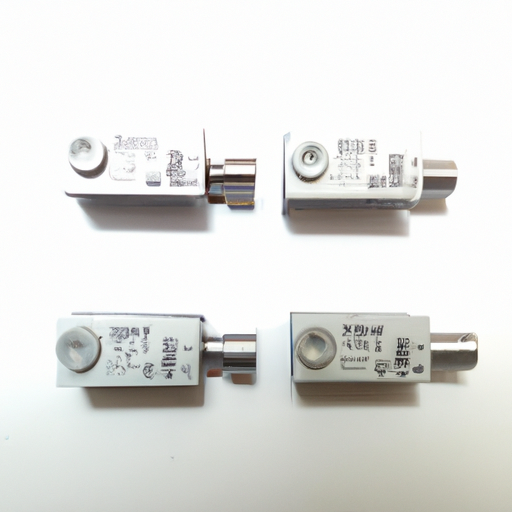Potentiometers are a type of variable resistor that are commonly used in electronic circuits to control the flow of electric current. They are widely used in a variety of applications, from audio equipment to industrial machinery. In this article, we will discuss the parameters that are important to consider when selecting a potentiometer for a mainstream product line.

2. Tolerance: Tolerance refers to the allowable deviation from the specified resistance value of the potentiometer. It is important to consider the tolerance of the potentiometer when selecting a product for a mainstream product line, as it can affect the overall performance and reliability of the circuit. Potentiometers with tighter tolerances are generally more expensive, but they offer greater precision and accuracy.
3. Power Rating: The power rating of a potentiometer is the maximum amount of power that it can safely handle without overheating or failing. It is important to select a potentiometer with a power rating that is appropriate for the application. Choosing a potentiometer with a power rating that is too low can result in overheating and damage to the circuit, while choosing a potentiometer with a power rating that is too high can result in unnecessary cost and complexity.
4. Mechanical Life: Mechanical life refers to the number of cycles that a potentiometer can withstand before it fails. It is important to consider the mechanical life of the potentiometer when selecting a product for a mainstream product line, as it can affect the overall reliability and longevity of the circuit. Potentiometers with higher mechanical life ratings are generally more durable and reliable, but they may also be more expensive.
5. Temperature Coefficient: The temperature coefficient of a potentiometer is a measure of how its resistance changes with temperature. It is important to consider the temperature coefficient of the potentiometer when selecting a product for a mainstream product line, as it can affect the accuracy and stability of the circuit. Potentiometers with lower temperature coefficients are generally more stable and reliable, but they may also be more expensive.
6. Size and Mounting: The size and mounting options of a potentiometer are also important parameters to consider when selecting a product for a mainstream product line. Potentiometers are available in a variety of sizes and mounting configurations, so it is important to choose a product that is compatible with the specific requirements of the application. For example, a smaller potentiometer may be required for applications with limited space, while a potentiometer with a specific mounting configuration may be needed for easy installation.
In conclusion, when selecting a potentiometer for a mainstream product line, it is important to consider a variety of parameters, including resistance value, tolerance, power rating, mechanical life, temperature coefficient, and size and mounting options. By carefully evaluating these parameters and choosing a potentiometer that meets the specific requirements of the application, you can ensure the reliability and performance of your circuit.
Potentiometers are a type of variable resistor that are commonly used in electronic circuits to control the flow of electric current. They are widely used in a variety of applications, from audio equipment to industrial machinery. In this article, we will discuss the parameters that are important to consider when selecting a potentiometer for a mainstream product line.

2. Tolerance: Tolerance refers to the allowable deviation from the specified resistance value of the potentiometer. It is important to consider the tolerance of the potentiometer when selecting a product for a mainstream product line, as it can affect the overall performance and reliability of the circuit. Potentiometers with tighter tolerances are generally more expensive, but they offer greater precision and accuracy.
3. Power Rating: The power rating of a potentiometer is the maximum amount of power that it can safely handle without overheating or failing. It is important to select a potentiometer with a power rating that is appropriate for the application. Choosing a potentiometer with a power rating that is too low can result in overheating and damage to the circuit, while choosing a potentiometer with a power rating that is too high can result in unnecessary cost and complexity.
4. Mechanical Life: Mechanical life refers to the number of cycles that a potentiometer can withstand before it fails. It is important to consider the mechanical life of the potentiometer when selecting a product for a mainstream product line, as it can affect the overall reliability and longevity of the circuit. Potentiometers with higher mechanical life ratings are generally more durable and reliable, but they may also be more expensive.
5. Temperature Coefficient: The temperature coefficient of a potentiometer is a measure of how its resistance changes with temperature. It is important to consider the temperature coefficient of the potentiometer when selecting a product for a mainstream product line, as it can affect the accuracy and stability of the circuit. Potentiometers with lower temperature coefficients are generally more stable and reliable, but they may also be more expensive.
6. Size and Mounting: The size and mounting options of a potentiometer are also important parameters to consider when selecting a product for a mainstream product line. Potentiometers are available in a variety of sizes and mounting configurations, so it is important to choose a product that is compatible with the specific requirements of the application. For example, a smaller potentiometer may be required for applications with limited space, while a potentiometer with a specific mounting configuration may be needed for easy installation.
In conclusion, when selecting a potentiometer for a mainstream product line, it is important to consider a variety of parameters, including resistance value, tolerance, power rating, mechanical life, temperature coefficient, and size and mounting options. By carefully evaluating these parameters and choosing a potentiometer that meets the specific requirements of the application, you can ensure the reliability and performance of your circuit.